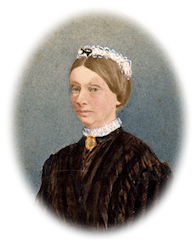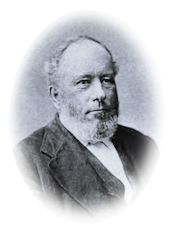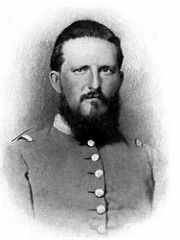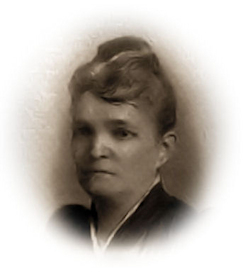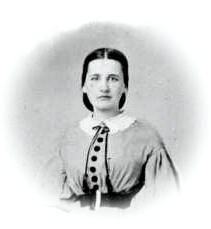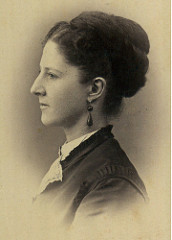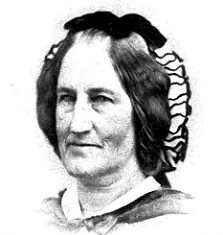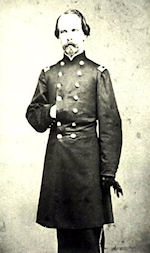Francis Bacon to Georgeanna Muirson Woolsey.
Tybee Island, Dec. 24, ‘61.
You speak of our hospital as a matter of course; and we are, by and by, to have one, as yet uncommenced; but we owe the medical department no thanks for this when we get it. Dr. Cooper, Medical Director of the expedition, a sensible man, urged the necessity of a hospital; Surgeon-General Finley thought otherwise – “in this mild southern climate tents would do very well for men to have fevers in.” It would suit my views of the fitness of things to have Surgeon-General Finley exposed in scanty apparel to a three days’ Texas norther, by way of enlarging his views of southern climates. . . .
I was just laying the foundations of a log hospital for our men at Port Royal when we were ordered here, and, as I have no compunction about committing any crime short of high treason for a hospital, I had effected a neat little larceny of a lot of windows and sawn lumber which were to work in so sweetly. It was a sad reverse to abandon it!
One great trouble has been to keep our sick men, with their lowered vitality, warm in tents. There is a popular prejudice against cannon balls which I assure you is wholly unfounded. My experience is that there are few pleasanter things to have in the family than hot shot. It would raise the cockles of your heart some of these wretchedly cold nights, to walk between the two long rows of men in my large hospital-tent just after they have been put to bed, each with his cup of hot tea and his warm thirty-two pound shot at his feet, and to see and feel the radiant stack of cherry-red balls in the middle of the floor. This is troublesome and laborious to manage, however, and we greatly need some little sheet-iron stoves. I sent for some a good while since, which should be here shortly. Your inquiry about medicines is a sagacious one, and shows that you have not neglected your hospital-walking opportunities. My dear unsophisticated friend, permit me to indoctrinate you in a dainty device whereof the mind of undepartmental man hath not conceived. Know that there is one supply-table of medicines for hospital use and another for field use. Some very important, almost essential, medicines are not furnished for field service; when your patient needs them he is to go to the hospital. Very good–where is the hospital for us? Now, before we left Washington, with a perfectly clear notion of what was likely to befall us in the way of fevers, and out of the way of hospitals, I made a special requisition for some things not in the field supply table, such as serpentaria, and some of the salts of iron, and went in person to urge it through the purveyor’s office. No use.
Ask any sensible, steady-going old doctor how he would feel with a lively fever clientele upon his hands, and no serpentaria or its equivalent.
I declare, it seemed to me like a special providence that in my pretty extensive “perusings” about these parts, I picked up, here and there, from rebel batteries and deserted houses, both serpentaria and many other needed medicines which have turned to the best account. . . .
If you should hear some day that some rebel Major-General had been rescued from impending death by hemorrhage by the application of Liq. Ferri Persulphat. in the hands of the surgeon of the 7th C. V., you may lay it all to that little bottle which was not the least wonderful content of that wonderful basket sent to Annapolis. The Tennyson and Barber inspired me with emotions too various and complicated here to describe; the bologna cheered and invigorated; the Castile soothed and tranquilized my soul; but at the sight of the Liquor Ferri Persulphatis! – – – what shall I say, except to repeat the words of our own Royston– “a halloo of smothered shouts ran through every vein!” and whenever since, I have started upon any expedition giving promise of bullets, I have popped the bottle into my pocket, hoping to use it upon some damaged rebel.
Our tents, flimsy speculator’s ware at best, are now in a most deplorable state. I am distressed to think of the possibility of a long rainy season overtaking us with no other shelter. . . .
This island upon which we are now encamped, though a lonely wilderness enough and several days farther from home than that which we have left, is on the whole more interesting, as it seems to offer “a right smart chance” of a fight. At any time we can, and often we do, get ourselves shelled from Pulaski by walking upon a certain stretch of the beach. This afternoon a rifled shell came squealing along in its odd way and plumped into the ground without exploding, a few yards from where my brother and I stood. The rascals seem to have defective fuses, and as yet they have hurt no one. By creeping along under bushes we get within Sharps’ rifle range of the great grim fort, and look right into its embrasures. Don’t mention that fact just now. . . . Every day, about the time Pulaski begins her afternoon shelling, “Old Tatnal”[1] runs down his fleet and gnashes his teeth at us from a safe distance, but doesn’t come within range of our new battery or the gunboats. We hear cannon practice at Savannah occasionally, and from one quarter or another great guns growl every few hours. On the whole, a lively place. . . .
Our jolly German neighbors have begun upon their Christmas eve with such rolling choruses right behind my tent, that I must step out to see. . . . –I find that they have a row of Christmas trees through their camp, all a-twinkle with candles, and hung with “hard-tack” curiously cut into confectionary shapes, and with slices of salt pork and beef. Sedate, heavy-bearded Teutons are sedulously making these arrangements, retiring a few paces to observe through severely studious spectacles the effect of each new pendant.
We have all the foliage orthodox for Christmas here, including holly and mistletoe with berries of scarlet and white wax. The jungly unscarred forest of this island is superb. . . . The purple grey depths of the wood all flicker with scarlet grosbeaks like flames of fire, and quaint grey and brown northern birds flit in and out with the knowing air of travelled birds, and plan the nests they will build next summer, in spite of bombs and bayonets, in New England elms and alders. . . .
I owe something to Captain Howland for keeping up my spirits, for, sometimes when I think how utterly these wretched Carolinians throw their best and their all into their bad cause as if they believed in and loved it, and then see, with a sort of dismay, how few, comparatively, of our first-rate men have come personally to the fight with self-sacrifice and out of pure love of the cause, I think of Captain Howland and take comfort of him at least.
[1] “Old Tatnal” originated the expression, “Blood is thicker than water,” when as flag officer of the U. S. squadron in ‘57, he came to the assistance of the English commander in Chinese waters. In 1861 he turned traitor to his flag.
